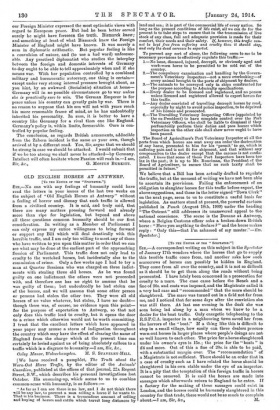OLD ENGLISH HORSES AT ANTWERP.
[To tax genes or TEZ .5.nc-nrcon"J 8111,—ICO one with any feelings of humanity could have read the letters in your issues of the last two weeks on the subject of "Old English Horses at Antwerp" without a feeling of horror and dismay that such traffic is allowed from a civilized country. It is said, and truly said, that there are many matters pressing forward and already more than ripe for legislation, but beyond and above all these questions common humanity should be our first consideration. In writing as a Member of Parliament I can only express my entire willingness to bring forward or support any Bill which will deal drastically with this horrible traffic, and I am only too willing to meet any of those who have written to you upon this matter in order that we can see what may be done at the earliest part of the approaching Session of Parliament. This traffic does not only lead to cruelty to the wretched horses, but incidentally also to the commission of crime. Only a few weeks ago I had to try a man at Quarter Sessions who was charged on three indict- ments with stealing three old horses. As he was found guilty on one indictment the others were not proceeded with, and therefore one has no right to assume that he was guilty of them ; but undoubtedly he had stolen one of the horses, and we will assume that some other person or persons bad stolen the other two. They were all old horses of no value whatever, but stolen, I have no donbt- though there was, of coarse, no evidence upon this point— for the purpose of exportation to Antwerp, so that not only does this traffic lead to cruelty, but it opens the door to a crime which otherwise would not be worth committing. I trust that the excellent letters which have appeared in your paper may arouse a storm of indignation throughout the country which may have the effect of clearing the name of England from the charge which at the present time can certainly be levied against us of being absolutely callous to a traffic which is a disgrace to humanity.—I am, Sir, Sic,
Orley Manor, Wolverhampton. H. S. STavnimr-Hfix,. [We have received a pamphlet, The Truth about the Worn-Out Horse 2'raffie, by the editor of the Animals' Guardian, published at the offices of that journal, 22a Regent Street, S.W., which describes his personal investigations last October. His summing-up, which seems to us to combine common-sense with humanity, is as follows :—
" As far a.s I ean see there is no law, and I do not think there will be any law, to prevent a man selling a horse if he wants to. That is his business. There is a tremendous amount of selling and buying of horses and cattle which travel long distances by land and sea; it is part of the commercial life of every nation. So long as the present conditions of life exist, all we can do for the present is to take steps to ensure that in the transmission of live stock of any class, full and adequate provision is made for their comfort, their needs and their safety. IA however, this traffic can- not be kept free from suffering and cruelty then it should stop, and stay the dead carcases be exported.
To prevent any sort of abuse, the following seem to me to be necessary provisions to effectively regulate this traffic :- 1.—No lame, diseased, injured, decrepit, or obviously aged and work-worn horse to be permitted to be sold out of the country. 2.—The compulsory examination and handling by the Govern- ment's Veterinary Inspectors—not a mere overlooking—of every animal brought to the ports of shipment by dealers. 1.—The animals to be conveyed only in ships constructed for the purpose according to Admiralty specifications. 4.—Every dealer to be licensed and registered, and no person unless licensed and registered allowed to export horses for this traffic.
5.—Any dealer convicted of travelling decrepit horses by road, especially by night to avoid police inspection, to be deprived of his licence and prosecuted.
6.—The Travelling Veterinary Inspecting Officer (appointed by the ex-President) to have complete control over the Port Veterinary Officers, who shall he liable to dismissal if they perfunctorily perform their duties and pass horses which inspection on the other side shall show never ought to have been passed.
The Board of Agriculture's Port Veterinary Inspector at all the porta from which horses are sent away can order the destruction of any horse, presented to him for his 'permit' to go, which is suffering pain and is not fit for shipment, and that without any compensation to the dealer except that tho carcase is not confis- cated. I know that some of these Port Inspectors have been too lax in the past ; it is up to Mr. Itunciman, the President of the Board of Agriculture, to ensure that no such laxity shall be permitted in future."
We believe that a Bill has been actually drafted to regulate the traffic, but at the moment of writing we have not been able to ascertain its provisions. Failing the enforcement of an obligation to slaughter horses for this traffic before export, the above suggestions, and those in the letter signed "Town Clerk" on the next page, seem to us to constitute a useful basis for legislation. As matters stand at present, the powerful cartoon published in Punch (August 18th, 1909) under the heading "The Outcast" still addresses its unanswered appeal to the national conscience. The scene is the Douane at Antwerp, where a Belgian Customs officer asks a broken-down British horse "Have you anything to declare ? " and the horse makes reply, "Only this—that I'm ashamed of my master."—En. Spectator.]






































 Previous page
Previous page